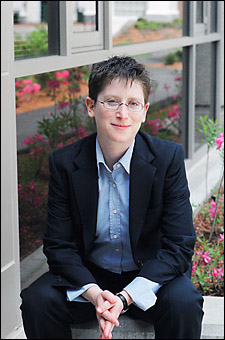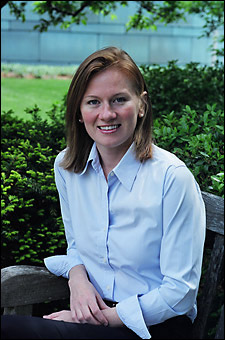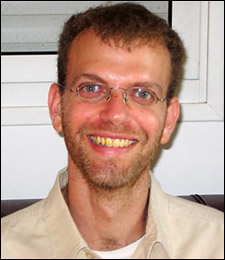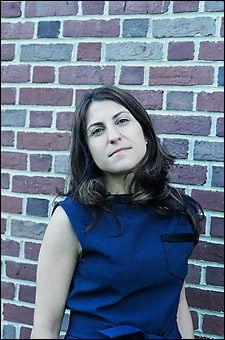Extraordinary service
Five HBS students recognized for leadership
A special kind of leadership, embodied in the selfless service of five Harvard Business School (HBS) students – Michael Arlotto and Jill Szuchmacher, Kathleen “Cassie” Kearney, Avichai “Avi” Kremer, Yael “Gayle” Tzemach – is being recognized this week with the 2006 Dean’s Award, one of HBS’s highest honors.

Thanks to two students who expanded the work of the Lesbian, Gay, Bisexual, and Transgender Student Association, Harvard Business School is a more diverse and welcoming community today than ever before.
One recipient helped lead more than 50 other students, faculty, and staff on a rebuilding mission to New Orleans during winter break.
Another single-handedly transformed how his native Israel regards amyotrophic lateral sclerosis, also known as Lou Gehrig’s disease, after he was diagnosed with the neurodegenerative disorder during his first year at the School. He also inspired his classmates to raise record amounts of money to support further research.
Both HBS and the world at large are more aware of the needs of small-scale entrepreneurs in developing countries – particularly the challenges facing women business owners in Afghanistan and Rwanda – because of the grassroots work of a Dean’s Award recipient seeking to help eradicate global poverty.
Noted Dean Jay O. Light, “It is a privilege to honor these students who have contributed in extraordinary ways both to the campus community and beyond. Outstanding role models, they personify Harvard Business School’s mission to educate leaders who make a difference in the world.”
Here’s a close-up look at the Dean’s Award recipients:
Contributing to the community’s diversity
“A bridge to diversity” is how several classmates describe Michael Arlotto and Jill Szuchmacher, two leaders of the School’s Lesbian, Gay, Bisexual, and Transgender Student Association (LGBTSA). Within both LGBTSA and the campus community, the duo has become known for championing diversity of all kinds – and for making sexual orientation a more easily discussed topic in that conversation.
Together with other LGBTSA members, they have increased the club’s membership and raised its profile on campus. This spring, an LGBT open house was held for the first time for newly admitted M.B.A. students, drawing several dozen participants. Arlotto helped plan the event out of personal conviction. Before arriving at HBS, he worried that he might not feel at home. “I am excited to say that I was wrong,” he said in a profile of him on the M.B.A. Admissions Web site (http://www.hbs.edu/mba/profiles/). “Classmates, faculty, and administrators have been very supportive of me and other gay and lesbian students on campus.”
A student with a military background credits Szuchmacher with helping her get to know her gay and lesbian classmates at HBS. “I’d had little interaction with the LGBT community before coming to campus, but I found only cooperation and understanding from Jill. She listened intently to my stories and enthusiastically asked questions in an effort to understand the military community I came from.”
Szuchmacher’s efforts to institute a diversity task force involving students, faculty, alumni, and staff have particularly moved this student – and moved her to nominate Szuchmacher for the Dean’s Award. “Jill has sought out input from administrators, professors, and other student leaders on this project. By serving as an ambassador of acceptance and tolerance to HBS and the greater Harvard community, she has made our school a truly better place.”
Arlotto’s role in identifying and inviting an openly gay executive to campus as a speaker, as well as his work in proposing and planning recent regional admissions recruiting events in San Francisco and Boston for potential LGBT applicants, received high praise from an HBS administrator. “These efforts were a considerable undertaking, and Michael deserves a lot of credit for the leadership he demonstrated in making them happen.”
Initiating a National Coming Out Day celebration at HBS was another project that Arlotto and Szuchmacher spearheaded. The two impressed many inside and outside the classroom by bringing clarity to difficult discussions involving sexual orientation, race, and gender. “What is great about Jill and Michael is that they never let up,” pointed out a student nominator. “At a time when many of our classmates were winding down and preparing for summer, those two were still going strong.”
Bringing help and hope to New Orleans

When Hurricane Katrina devastated New Orleans last year, Cassie Kearney immediately joined forces with other HBS students who wanted to help with relief and rebuilding efforts. She became a founding member of the HBS Student Association Hurricane Relief Committee – an organization of 10 first- and second-year students – and was selected to lead the group’s community rebuilding team.
Throughout the fall term, four student teams did fundraising and prepared for a weeklong January trip to Louisiana, focusing not only on relief efforts, but also on assisting the mayor’s “Bring Back New Orleans Commission” as well as economic redevelopment and public education improvement projects already under way. As a result of her preliminary efforts to find an appropriate local partner for her team, Kearney found a small organization in New Orleans that was eager to use her group’s help to prepare homes for rebuilding assessments by federal and regional agencies.
A former manager in the hospitality industry, Kearney secured 25 donated rooms in a local hotel for 57 HBS volunteers, including students, faculty, and staff. She also organized a kickoff dinner on the group’s first night in New Orleans that included Mayor Ray Nagin and his staff, local HBS alumni, and other prominent members of the community.
But it was Kearney’s daily work as a team leader that most impressed her fellow volunteers. “Our work was both physically and mentally challenging,” recalled an HBS administrator who nominated her for the award. “We gutted homes that had been damaged by as much as 12 feet of water – a task that involved removing debris, shoveling mud and oil, and finally, tearing down walls to the studs. Although the conditions were abominable, Cassie kept our spirits up in all sorts of ways, from organizing evening events to arranging care for team members who got sick. She always made us feel that our well-being was of utmost importance to her.”
Seeking a cure with help from his friends
What do you do if you’re in your first term at HBS, filled with excitement about the future, and you learn that you have a neurodegenerative disorder? If you are Avi Kremer, you stay in school and fight back.

But you fight not only for your own life, but also for the lives of 100,000 other people worldwide who are afflicted with amyotrophic lateral sclerosis (ALS), which is also known as Lou Gehrig’s disease. You especially dedicate yourself to helping physicians and scientists in your native Israel find a cure.
And most important, you don’t fight alone: You join forces with 90-plus “section mates,” the other HBS students with whom you take all of your first-year classes and form some of the most supportive friendships of your life.
Shortly after his diagnosis, Kremer set out with the other members of Section I (each of the 10 sections at the School is named after a letter of the alphabet) to raise $100,000 from the HBS community for ALS research. Section I organized a fundraiser for Valentine’s Day, distributing over 1,300 bags of candy and flowers with notes that described ALS – and inspired many on campus to wear red that day as a sign of support. As part of another ALS awareness event, section members distributed more than 1,000 red “Strikeout ALS” bracelets. In addition, other sections joined in, donating a portion of their annual charity auctions to the ALS cause. The total amount raised came to more than $150,000.
After completing the first year of the M.B.A. program, Kremer headed home to Israel for a summer job in private equity, but he was soon deeply involved with an ALS nonprofit called IsrALS. Discovering that research efforts in Israel lacked both cohesion and funding, he mounted a national campaign to bring together researchers, donors, and investors, gaining a reputation as an impassioned and articulate spokesman for the cause. Postponing his return to HBS, he became the head of IsrALS – and helped raise $2 million for research. In January, Kremer returned to campus to resume his studies.
“What Avi set in motion in Section I is breathtaking,” noted one HBS professor. Another called Kremer “a true hero,” while a third stated, “I could not imagine that a single individual could have such an impact in such a short period of time.”
Student nominators were equally eloquent. “Avi has contributed more to my personal growth than anyone else,” one student wrote. Said another: “Avi leads by example, with charisma and authority.” A section mate summed up many students’ feelings when he stated: “Avi has taught us that there is endless goodness in the human heart. He has shown us that we don’t have to wait to make a difference; we can do so right here, right now.”
Helping women entrepreneurs overcome obstacles

Gayle Tzemach traveled to Rwanda alone during a school break and later to Afghanistan so that she could see women entrepreneurs in action in these struggling postwar countries. A seasoned journalist before coming to HBS, she used her experiences as the basis of two articles she wrote for the Financial Times profiling women business owners in both countries who ran small but thriving organizations – including a construction company and a dress shop in Kabul and a flower business and a computer assembly company in Kigali – despite harsh obstacles at every turn.
A tireless advocate of small-scale entrepreneurship as a way of combating global poverty, Tzemach reached out to the HBS community before she arrived on campus as a student. She had learned of the School’s involvement with the Global Micro-Entrepreneurship Awards (GMA), a student-led initiative with the United Nations Development Programme and Citigroup Foundation that sponsors business contests for small-scale entrepreneurs worldwide – and asked if she could help.
Tzemach contributed immediately by developing a media strategy to raise awareness of the new program. As a co-leader of the GMA Student Alliance during her second year at HBS, she helped expand the program from six countries to 33 – reaching more than 500 global micro-entrepreneurs. Tzemach also served as a principal program liaison for the sponsoring organizations, and oversaw more than 50 students from six graduate schools working on the initiative. Beyond all that, she helped organize the Harvard International Development Conference at the Kennedy School of Government last year, and a Washington, D.C., “trek” for HBS students interested in learning more about the government’s role in reducing worldwide poverty.
Tzemach’s hands-on approach impressed one student who nominated her for the Dean’s Award. “Gayle seeks to truly understand the situations facing impoverished people, particularly women,” wrote this student. “She serves as a steward, as an advocate, working side by side with the people she assists in their battle against poverty.”
A faculty member who advised Tzemach and oversaw an HBS case study she wrote on female entrepreneurs in Afghanistan pointed out that her work has influenced the way Harvard M.B.A. students address poverty issues. “Gayle has demonstrated that poverty in developing countries can be dealt with through entrepreneurship and not just charity.”




